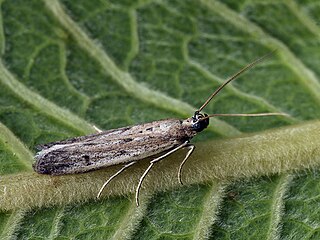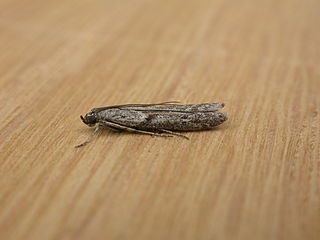
Homoeosoma nebulella, the Eurasian sunflower moth, is a moth of the family Pyralidae. It is found in Europe, Russia, Anatolia, the Middle East and West Africa. The wingspan is 20–27

Homoeosoma is a genus of moths of the family Pyralidae.
Homoeosoma albicosta is a species of snout moth in the genus Homoeosoma. It is found in Australia.

Homoeosoma inustella is a species of snout moth in the genus Homoeosoma. It was described by Ragonot in 1884. It is found in Spain, France, Italy, Switzerland, Austria, the Czech Republic, Slovakia, Hungary, Romania, Bulgaria, North Macedonia, Ukraine, Belarus and Russia.
Homoeosoma lechriosema is a species of snout moth in the genus Homoeosoma. It was described by Alfred Jefferis Turner in 1947. It is found in Australia.
Homoeosoma privata is a species of snout moth in the genus Homoeosoma. It was described by Francis Walker in 1875 and is known from St. Helena.
Homoeosoma stenopis is a species of snout moth in the genus Homoeosoma. It was described by Alfred Jefferis Turner in 1904. It is found in Australia.

Homoeosoma vagella, the macadamia flower caterpillar, is a species of snout moth in the genus Homoeosoma. It was described by Philipp Christoph Zeller in 1848. It is found in Australia.
Homoeosoma achroeella is a species of snout moth in the genus Homoeosoma. It was described by Émile Louis Ragonot in 1887, and is known from Kazakhstan and Turkey.

Homoeosoma impressale is a species of snout moth in the genus Homoeosoma. It was described by George Duryea Hulst in 1886. It is found in North America, including Arizona and California.
Homoeosoma inornatellum is a species of snout moth in the genus Homoeosoma. It was described by George Duryea Hulst in 1900. It is found in North America, including New Jersey and Pennsylvania.
Homoeosoma oslarellum is a species of snout moth in the genus Homoeosoma. It was described by Harrison Gray Dyar Jr. in 1905. It is found in California, United States.
Homoeosoma phaeoboreas is a species of snout moth in the genus Homoeosoma. It was described by R. L. Goodson and Herbert H. Neunzig in 1993. It is found in the western U.S. state of Washington.
Homoeosoma emandator is a species of snout moth in the genus Homoeosoma. It was described by Carl Heinrich in 1956. It is found in North America.
Homoeosoma uncanale is a species of snout moth in the genus Homoeosoma. It was described by George Duryea Hulst in 1886. It is found in North America, including Arizona and California.
Homoeosoma ardaloniphas is a species of snout moth in the genus Homoeosoma. It was described by R. L. Goodson and Herbert H. Neunzig in 1993. It is found in North America, including North Dakota.
Homoeosoma eremophasma is a species of snout moth in the genus Homoeosoma. It was described by R. L. Goodson and Herbert H. Neunzig in 1993. It is found in North America, including Arizona.
Homoeosoma straminea is a species of snout moth in the genus Homoeosoma. It was described by Walter Rothschild in 1921. It is found in Niger.
Mattesia is a genus of parasitic alveolates of the phylum Apicomplexa. Species in this genus infect insects.



